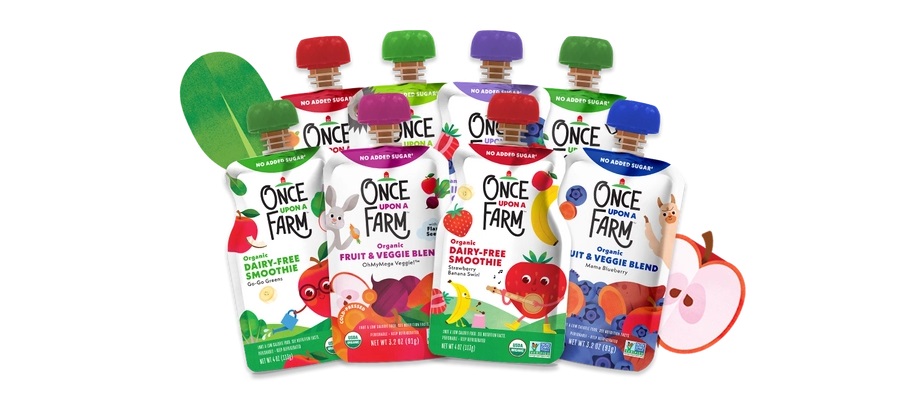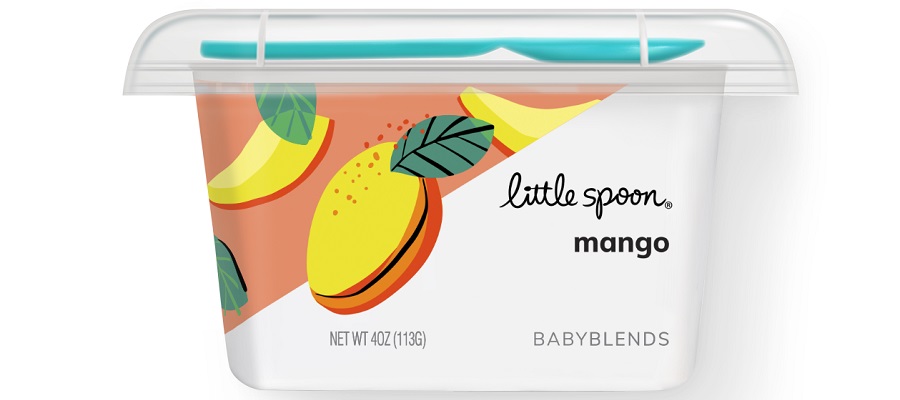Once Upon a Farm is a brand of organic baby food that was founded in 2013. As of my knowledge cut-off in September 2021, the company offers a variety of cold-pressed, organic baby food products such as purees, pouches, and snacks for babies and toddlers. The brand emphasizes using high-quality, organic, non-GMO ingredients that are locally sourced and minimally processed to preserve their nutritional value.
The company claims that their products are made from whole foods, which is similar to the food families would make at home. They also claim that their products are free from artificial preservatives, fillers, or thickeners. They also offer a wide variety of flavor options for babies to try new tastes.
In terms of safety and quality, Once Upon a Farm follows strict food safety protocols to ensure the safety of their products, and are certified organic by the USDA. They also have certifications from third-party certifying bodies such as the Non-GMO Project and the USDA.
Once Upon a Farm offers a subscription-based delivery service, where customers can choose the frequency and products that they want to receive. They also offer a variety of options for customers with dietary restrictions such as gluten-free, dairy-free, and nut-free.
The company has received positive reviews for the quality of their ingredients and taste of their products, as well as for their commitment to using sustainable and eco-friendly packaging.
What types of products does Once Upon a Farm offer for babies and toddlers?
Once Upon a Farm is a brand of organic baby food that offers a variety of cold-pressed, organic baby food products for babies and toddlers such as purees, pouches, and snacks. These products typically contain fruits and vegetables, as well as other whole foods ingredients such as grains and proteins. They offer a wide variety of flavor options for babies to try new tastes. Once Upon a farm also offer snacks and finger food for babies and toddlers. Once Upon a Farm claims that their products are made from whole foods, which is similar to the food families would make at home and free from artificial preservatives, fillers, or thickeners.
What are the ingredients used in Once Upon a Farm's baby food products?
Once Upon a Farm baby food products are made with organic, non-GMO ingredients that are locally sourced and minimally processed. They typically include fruits, vegetables, and other whole foods ingredients such as grains and proteins. The ingredients are chosen to provide a balance of essential vitamins and minerals needed by babies and toddlers. Some specific examples of ingredients that might be used in Once Upon a Farm baby food products include apples, berries, carrots, spinach, sweet potatoes, squash, quinoa, and chia seeds, but this may vary depending on the product and availability. Some of their products also contain dairy and meat in it but some of them are made to be vegan. They also use herbs and spices to add flavor to their products.
Is Once Upon a Farm certified organic and How does Once Upon a Farm ensure the safety and quality of its products?
Once Upon a Farm is a brand of organic baby food that prides itself on using high-quality, organic, non-GMO ingredients that are locally sourced and minimally processed to preserve their nutritional value.
When it comes to certifications, the company is certified organic by the USDA, which means that they follow the USDA's strict standards for organic production and handling, which include the use of organic ingredients, the absence of synthetic pesticides and fertilizers, and other requirements. The company also holds certifications from third-party certifying bodies such as the Non-GMO Project, which ensures that their products do not contain genetically modified organisms. These certifications ensure that Once Upon a Farm products meet the highest standards for organic farming and food production.
To ensure the safety and quality of their products, Once Upon a Farm follows strict food safety protocols, such as using food-grade packaging and ensuring that the products are stored and shipped at the appropriate temperatures. They also have HACCP plans in place and get regular inspection by the USDA and FDA. Additionally, their facility undergoes regular sanitation and allergen control procedures.
Once Upon a Farm also use the flash-freezing process to preserve the product's taste and texture, which helps to keep the nutritional value of the ingredients. This process preserves the food quickly in its raw state, trapping all the nutrients and enzymes inside the cell structure, which is why Once Upon a Farm's products have a shelf life of up to 18 months.
The company also has a focus on sustainability, using eco-friendly packaging that is also safe for babies and they are always looking to improve the sustainability of their products throughout the entire supply chain.
In addition to these safety and quality measures, Once Upon a Farm is also committed to transparency with their customers. They provide detailed information about the ingredients used in their products, the nutritional benefits and the process they use to make them, they also offers a variety of options for customers with dietary restrictions such as gluten-free, dairy-free, and nut-free.
Overall, Once Upon a Farm is a brand that takes the safety and quality of its products very seriously. They use high-quality, organic, non-GMO ingredients and follow strict food safety protocols to ensure that their products are safe and nutritious for babies and toddlers. They also hold several certifications and seals of approval that attest to the high standards of their products.
What are the nutritional benefits of Once Upon a Farm's baby food products?
Once Upon a Farm's baby food products are designed to provide a balance of essential vitamins and minerals needed by babies and toddlers. They are made with organic, non-GMO, locally sourced ingredients that are minimally processed to preserve their nutritional value.
The nutritional benefits of Once Upon a Farm's products vary depending on the specific ingredients used in each product, but in general they are rich in vitamins and minerals that are essential for babies and toddlers, such as:
- Vitamin A: found in fruits and vegetables such as sweet potatoes, carrots, and apricots, helps to maintain healthy skin and vision
- Vitamin C: found in fruits and vegetables such as strawberries, oranges, and spinach, helps to boost the immune system and form collagen
- Vitamin D: found in fortified dairy products and fatty fish, helps to support bone health
- Iron: found in meats, beans, and leafy greens, helps to support the formation of red blood cells and the transport of oxygen throughout the body.
- Fiber: found in fruits, vegetables and whole grains, helps to support a healthy digestion.
- Protein: essential for growth and development, and can be found in meats, beans, and legumes.
In addition to these vitamins and minerals, Once Upon a Farm's products are also a source of other essential nutrients such as antioxidants and omega-3 fatty acids. They aim to provide a balanced and nutritious diet for babies, but as with all baby food, it is best to consult with a pediatrician or nutritionist to determine what specifically is best for a child.
The company also provides detailed ingredient and nutrition information on the packaging of their products, giving the parents more clarity on what they are feeding their child.
Are Once Upon a Farm products suitable for children with food allergies?
Once Upon a Farm products are made with non-GMO, organic ingredients that are locally sourced and minimally processed, but some of their products may contain common allergens such as dairy, soy, and nuts. It is important to note that all babies and children are unique and have different sensitivities. If your child has a food allergy or sensitivity, it is recommended that you check the ingredients list of the product before purchasing or using it.
The company does provide allergen information on their packaging, and they also offer a variety of options for customers with dietary restrictions such as gluten-free, dairy-free, and nut-free. However, it is always recommended to check with your pediatrician or a certified allergist to confirm that the products are suitable for your child's specific dietary needs. Additionally, They also have strict allergen control procedures in place in their facility to minimize the risk of cross-contamination.
It is also worth noting that there is a risk of cross-contamination of allergens during the production process, even with allergen control procedures in place, so parents with allergic babies should be extra cautious and always read the label carefully before feeding their baby.
Are Once Upon a Farm products suitable for children with specific dietary restrictions, such as gluten-free or nut-free?
Once Upon a Farm offers a variety of options for customers with dietary restrictions such as gluten-free, dairy-free, and nut-free. However, it is important to note that not all of their products are specifically formulated to meet these dietary restrictions. Some of their products contain gluten or nuts, so it is important to check the ingredients list before purchasing or using them.
It is also worth noting that while they do have strict allergen control procedures in place in their facility to minimize the risk of cross-contamination, there is still a risk of cross-contamination of allergens during the production process. So, it is always recommended to check with your pediatrician or a certified allergist to confirm that the products are suitable for your child's specific dietary needs.
The company provides detailed information on the packaging of their products, giving the parents more clarity on what they are feeding their child. They also clearly indicate the presence of potential allergens in the product, such as gluten or nuts, to help the parents make informed choices.
It is important to remember that babies and children are unique, with different sensitivities and dietary needs, so it is best to consult with a pediatrician or a nutritionist before giving a baby any new food, and especially if they have a food allergy or dietary restriction.


